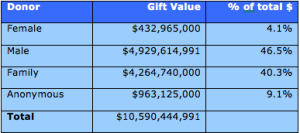After I wrote my last blog voicing my concerns that the social sector is missing an opportunity because women are not fully engaged in philanthropy, I had to wonder how big this problem this really is. In an age when women are receiving more advanced degrees than men, leading companies and organizations, and even running for president; perhaps, what I was noticing was really just a few individuals rather than a massive problem. Really, what is the extent of this problem?
To answer this question, looked at grantmaking data that is complied each year, by the Chronicle of Philanthropy of U.S. grants that are over $1M. The data set is by no means comprehensive; it requires organizations to self-report the grants, but it represents an excellent sample of many of the largest philanthropic gifts in America. According to the Chronical of Philanthropy’s data, there were 850 grants of $1M or over in 2014, representing $10.6B in grants.
I wanted to understand how many of these grants were given by women, so I simply went through the donor list and categorized the donors by gender. I also included an option for family giving and anonymous gifts. What I found was stunning; it turns out that women give far far fewer large grants than men both in $ amounts and in the total number of gifts. Of the $10.6B in major gifts last year, only 4% ($432M), was attributable to female donors. By comparison, 47% ($4.9B) could be attributed to a male giver, 40% ($4.3B) was attributable to a family, and 9% ($963M) was given anonymously. The figure below summarizes these findings.
The discrepancy is between male and female giving is shocking. Some of the gender gap may be attributable to dataset itself, which might just have oversampled male giving, or women might be more likely to attribute their gifts to their family rather than their own name. Even if these data issues are true, the descrepency between male and female giving is so large that there is clearing something more pronounced happening. So what is it? Why are men so much more likely to make large philanthropic gifts while women seem to be almost missing in this space? While the data doesn’t give us answers, I do have a hypothesis.
Philanthropy is heavily tied to the financial literacy and financial empowerment of women. Unfortunately, while women are in control of their finances more than ever before, they still face considerable challenges when making financial decisions. A large study by Prudential found that while an increasing number of women are income generators, only 27% of married women say the “take control” of financial and retirement planning. Another study by Financial Finesse concluded that women are falling further behind in two key areas: money management, which is the foundation of all financial planning, and investing, which is crucial to women being able to build wealth. While it is difficult to make sweeping generalizations across and entire gender, I believe women frequently do not feel empowered to speak up and often back down because they feel less knowledgeable about investments and financial decisions than the men in their lives. I see this and hear about this dynamic playing out more often than not among my clients, colleagues and friends. I also believe this to be true across all age groups, not just among older generations.
Conversations around philanthropy are highly related to the financial picture of an individual or family so when women do not engage in financial planning discussions they also then step away from philanthropic decision making. Men seem to be giving big while women give small. Women appear more likely to manage a smaller pot of money within a family and then spread their wealth among a smattering of organizations. Men are more often the decision makers when it comes to big gifts and then divide it among fewer organizations.
In order to engage more women in philanthropy in a big way, I believe women need to feel more empowered around their personal finances and their role as philanthropists. Women are quickly acquiring wealth as breadwinners and through the massive wealth transfer that is underway in our society, but unless we engage them more fully in financial conversations, philanthropy and the social sector will continue to lose their incredible skills and knowledge.



Christine,
Thanks for posting this interesting article. Who knew there would be such a wide discrepancy in donor gifting based on gender? It leaves me wondering …how many of the families donating to charities are led by women? But that would still be split by gender as well. I wonder if it revolves a sense of financial scarcity that women may carry and men do not. Perhaps a hangover from the wage discrepancy between genders that is still very real, single parenting which so many women experience and other situational events. Do these types of experiences create emotions and fear that leave women feeling they must preserve their wealth for whatever life may throw their way next . Suzanne
This is a unique place for fashionable women’s clothing and accessories.
We offer our clients women’s clothing, jewelry, cosmetics and health products, shoes, bags and much more.
https://fas.st/Ujfha
глазирования машина
конфетоформующая машина
охлаждающий тоннель
тестотсадочная машина
мармеладоотливочная машина
мармеладоотливочная машина
глазирования машина
Kanpur, known in the British period as Cawnpore, is an Indian metropolis in the state of Uttar Pradesh. The greater metropolis is divided into two districts: the urban district of Kanpur Nagar and the rural district of Kanpur Dehat, with the city in the urban district, along with some other townships.
Kanpur
My new hot project|enjoy new website
http://teenthroatporn.lexixxx.com/?donna
oprn videos erotica free porn of lesbians licking pussy queens blade porn master of porn director spanis quiff porn
[url=https://xxxsexyteens.net/black-pussy/]sex pictures black girls[/url]
Профессиональный монтаж напольных покрытий.Обращайтесь всегда рады вам помочь.
Мы делаем следующие работы
Монтаж напольного плинтуса из массива
Монтаж напольного плинтуса МДФ
Монтаж напольного плинтуса дюрополимер
Монтаж напольного плинтуса ПВХ
Монтаж напольного плинтуса ЛДФ
Монтаж потолочного плинтуса.
Монтаж напольного плинтуса из металла и т.д кроме камня.
Покраска плинтуса.
Монтаж напольных покрытий
Монтаж паркетной доски на подложку.
Монтаж ламината.
Монтаж винилового ламината
Монтаж инжинерной доски
Монтаж моссивной доски (с готовым покрытием)
Монтаж фанеры.
Монтаж галтелий и наличников.
По другим работам уточняйте!
гарантия на все виды работ.
Напилим.про
augmentin from canada
ivermectin usa price
sildenafil 200mg
doxycycline australia
pharmacy rx
how to order sildenafil
ivermectin tablet price
ivermectin 0.08
where can i buy stromectol
ivermectin ireland
ivermectin uk coronavirus
ivermectin stromectol
ivermectin otc
ivermectin 400 mg brands
stromectol australia
ivermectin cream 5%
ivermectin buy
ivermectin tablets
purchase stromectol online
ivermectin lotion cost
stromectol coronavirus
ivermectin buy online
ivermectin
ivermectin generic name
cost of stromectol
generic ivermectin for humans
ivermectin 5 mg price
generic cymbalta online
I’m not that much of a internet reader to be honest but your blogs really nice, keep it up!
I’ll go ahead and bookmark your site to come back later on. Many thanks
Great site you have got here.. It’s difficult
to find high-quality writing like yours these days.
I really appreciate individuals like you!
Take care!!
rx sildenafil tablets
I know this if off topic but I’m looking into starting my own blog and was curious what
all is needed to get setup? I’m assuming having a blog like yours would cost a pretty
penny? I’m not very internet smart so I’m not 100% certain. Any recommendations or advice would be greatly
appreciated. Kudos
Saved as a favorite, I love your web site!
how much kamagra jelly should i take
Instagram Takipçi Satın Almanızın İşleminin Hesaba
Etkisi
Takipçi almak, Instagram üzerinde popülerliği yakalamak isteyen hesapların kullandığı bir yöntemdir.
Son zamanların gözde sosyal medya platformlarından olan Instagram, her geçen kendini yenileyip güncellemesi ile kullanıcı sayısını milyonlara
ulaştırmıştır.
Fotoğraf ve video paylaşma platformu olan zaman içinde firmaların e-ticaret alanına dönüşmüş ve insanlara ek
gelir kapışı olmuştur.
Instagram Takipçi Satın Almanın Profiliniz için Önemi
Popülerlik ya da ek gelir isteyen kişiler için önemli hale gelen uygulamada bu başarıyı yakalamanın yolu takipçi
sayısına bağlı olur. Intagram’ da yüksek takipçi
sayısına sahip olmak
ile pek çok insanın dikkatini çekmek daha kolay olur.
Instagram’ da doğal yollar ile takipçi elde
etmek diğer sosyal medya
uygulamalarına göre daha zor olması nedeni ile
Instagram takipçi satın al işlemine başvurulur. Bu işlem,
hesabın daha öne çıkmasını sağladığı
gibi daha fazla etkileşim almasına da yarar.
Etkileşim alan bir hesap da Instagram keşfet alanına çıkar
böylelikle daha çok takipçi hesabı takip etmeye başlar.
https://rebrand.ly/takipz
Hızla Yükselen Bir Fenomen Olmak İçin İnstagram
Takipçi Satın Al
Türkiye’nin en çok tanınan fenomenlerinin aylık ne kadar kazandığını biliyor musunuz?
Peki, İnstagram takipçi satın al hizmeti sayesinde yüksek kazançlara ulaşmanın mümkün olduğunu?
Eğer siz de bir sosyal medya fenomeni olmak istiyorsanız,
doğru stratejiyi uyguladığınızdan emin olmalısınız.
İşte, adım adım fenomen olmak için yapmanız gerekenler.
https://u.to/h_NHGw İnstagram Takipçi Satın Al
Kalıcı İnstagram Takipçi Satın Al : Kazanmaya Başla
Takipçilerinizin kalıcı olmasını istiyorsanız,
öncelikle İnstagram takipçi satın al sayfamızda
yer alan gerçek takipçi paketlerimizden birini tercih etmelisiniz.
Türk takipçilerin yer aldığı birbirinden ekonomik paketlerimiz ile siz de hızla büyüyen bir profile sahip olabilirsiniz.
Düzenli İçerik Yüklediğinizden Emin Olun
Bir sosyal medya platformunda fenomen olmak istiyorsanız, düzenli ve kaliteli
içerik üretmelisiniz. Hedef kitlenizin yaş ve profiline
uygun içerikler üretmek ve bunu düzenli şekilde yapmak sizin organik olarak yeni takipçiler kazanmanızı sağlar.
Satın aldığınız takipçilerin de profilinizi ömür boyu takip
etmesini istiyorsanız gönderilerinizin takipçilerinize
uygun olduğundan emin olmalısınız.
Takipçi Satın Al sende kazan
Why viewers still use to read news papers when in this technological globe all
is available on web?
australia viagra
Hey There. I found your weblog the use of msn. That is a very smartly written article.
I will be sure to bookmark it and come back to read more of your useful information. Thank
you for the post. I’ll certainly comeback.
buying celebrex in mexico
kamagra oral jelly
A fascinating discussion is definitely worth comment.
I believe that you ought to write more about this issue, it
may not be a taboo subject but generally people don’t speak about such subjects.
To the next! Best wishes!!
finasteride cream
stromectol tab
tadalafil 2.5 mg price